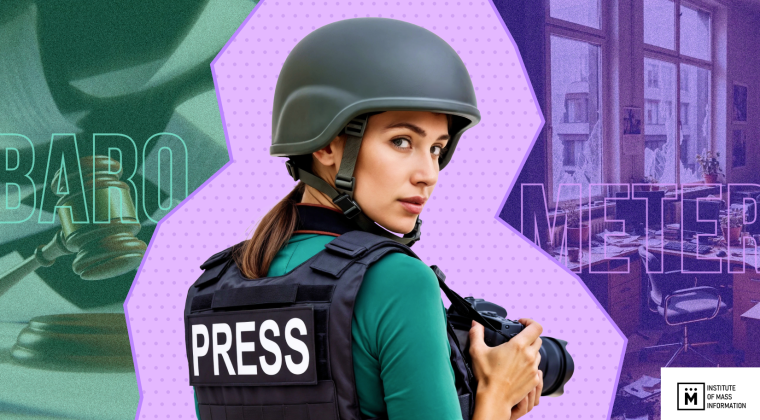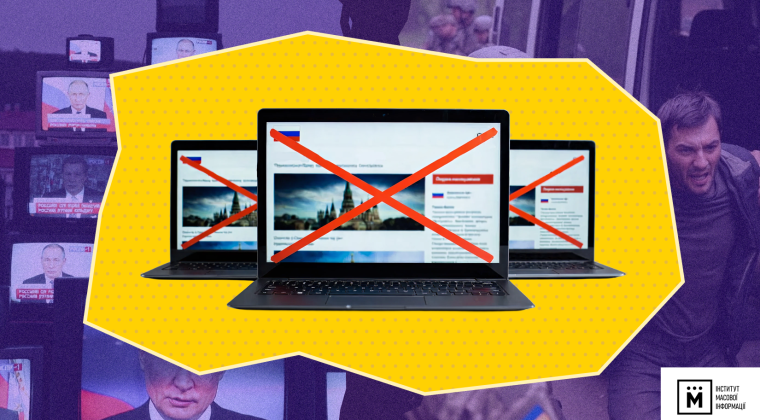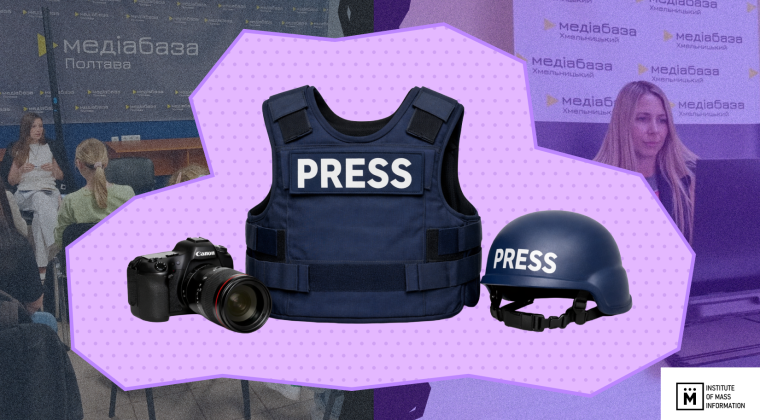In March, the IMI recorded 155 crimes Russia committed against the media and journalists in Ukraine. These crimes include murder, shelling and wounding of journalists, threats, harassment, abduction of journalists, shelling and seizure of TV towers, hacking attacks on Ukrainian media sites, shelling of media offices, disabling Ukrainian broadcasting, blocking access to Ukrainian media sites in Russia and the occupied Crimea. .
According to IMI, six journalists were killed in the line of duty. At least six journalists were injured in March as a result of shelling by the Russian invaders.
IMI has recorded eight cases of capturing and abduction of journalists. At least 10 journalists were taken prisoners. Most have already been released, but the fate of one of the journalists, Dmytro Khilyuk, is still unknown.
Six journalists were killed in the line of duty. Of these, three Ukrainian and three foreign. Two women and four men.
1/Yevhen Sakun, cameraman of LIVE TV channel (died on March 1 during the Russian rocket attack on the TV tower in Kyiv);
2/Brent Renaud, a former correspondent for The New York Times (shot dead by Russians on March 13 in Irpen at a checkpoint);
3/Pierre Zakzewski, cameraman for Fox News, an Irish citizen ( killed on March 14 during artillery shelling by Russian troops in the village of Gorenka, Kyiv region);
4/Oleksandra Kuvshinova, Ukrainian filmmaker, journalist ( died on March 14 together with Pierre Zakzewski during the artillery shelling by Russian troops in the village of Gorenko, Kyiv region);
5/Oksana Baulina, a journalist with Russia’s opposition newspaper The Insider and collaboAlexei Navalny’s Anti-Corruption Foundation (died on March 23 under Russian shelling in Kyiv while working as an editor).
6/Maksym Levin, journalist went missing on March 13, found dead on April 1.
At least six journalists got wounded by shelling of the Russian occupiers:
1/Guillaume Briquet, a Swiss journalist (he was injured on March 6 in the Mykolaiv region by the Russian shelling of the car he was driving. He was also robbed. At the same time, the occupiers clearly saw the “press” sign on the car);
2/Marian Kushnir, Radio Liberty (RFE/RL) correspondent (wounded in the March 11 rocket attack near Kyiv);
3/Juan Diego Herrera Arredondo, an American journalist ( wounded on March 13 in Irpen near Kyiv as a result of shelling by Russian troops).
4/Benjamin Hall, a correspondent for the American TV channel Fox News (seriously injured and sent to hospital, which he received on March 14 while preparing a report outside Kiev).
5/Andriy Tsaplienko, journalist of TSN. Tyzhnya TV channel 1 + 1 (got a shrapnel wound on March 25 during the shelling of a column of civilians in the Chernihiv region by Russian troops).
6/Oleksandr Navrotsky, cinematographer (he was seriously injured on March 26 during a shooting in the Kyiv region under multi-rockets shelling HRADY).
Capture and abduction
The fixer and translator for the French radio station Radio France Nikita (name changed) was abducted by the occupiers on March 5 in a village in central Ukraine, tortured and held captive for nine days.
1/Victoria Roshchina, a journalist for Hromadsky, was held in captivity. On March 21, the Russian occupiers set her free.
2/Oleg Baturyn, journalist went missing on March 12 , and was set free on March 20.
3/Yulia Olkhovska, journalist of the newspaper “Melitopolski Vedomosti”. She was abducted on March 21 and released on the same day.
Lyubov Chaika, journalist of the newspaper “Melitopol Information”. She was abducted on March 21 and released on the same day.
Mykhailo Kumok, publisher of the newspaper Melitopolski Vedomosti. He was abducted on March 21 and released on the same day.
Yevhenia Boryan, editor-in-chief of the newspaper “Melitopolski Vedomosti”. She was abducted on March 21 and released on the same day.
The father of Svitlana Zalizetska, a journalist and director of the Melitopol main newspaper and the RIA-Melitopol website, was taken hostage and released on March 25.
Dmitry Khilyuk, correspondent of the UNIAN news agency: captured by the Russian military.
Iryna Dubchenko, a Zaporizhzhya journalist: hold a prisoner, was taken to Donetsk.
The invaders fired at nine TV towers in seven regions of Ukraine: Kyiv and the village of Vynarivka (Kyiv region), Kharkiv (twice hit the TV tower), Rivne, Vinnytsia, Korosten (Zhytomyr region), Lysychansk (Luhansk region), Bilopillya (Sumy region), Izyum (Kharkiv region) ). As a result of Russian air strikes, Ukrainian broadcasting has completely or partially disappeared in these regions.
In addition, the occupiers took over Ukrainian media outlets and switched on Russian channels. In particular, the Russian occupiers forcibly shut down Kherson and Melitopol from Ukrainian broadcasting, and the occupiers mined the Public building in Kherson.
IMI has also recorded numerous DDoS attacks on Ukrainian online media sites and NGOs covering Russia’s war against Ukraine. Media sites hacked, changed news, posted Russian symbols or calls to surrender. Thus, the sites of Suspilne, NV, Channel 5, “Babel”, Lutsk site “Konkurent”, the publication “Poltavska Khvylya”, the site of the Kherson newspaper “Novy Den”, the financial publication Minfin.com.ua, the Kherson edition MOST, the site Espresso TV channel, etc. In addition, IMI recorded phishing attacks on Ukrainian newsrooms and journalists.
Russian crimes against journalists and media have been recorded in 15 regions of Ukraine. Russia has committed the most crimes in Kyiv and the region (murders, injuries, disappearances, abductions, shelling of journalists, threats, cybercrime). Then Zaporizhia and Kherson: some cities in these regions are occupied by the Russian army – there have been cases of abductions, attacks on journalists, threats, cybercrime, seizure of media outlets and the shutdown of Ukrainian broadcasting. Many Ukrainian newsrooms worked intermittently due to sirens and shelling throughout Ukraine.
Freedom of speech issues in Ukraine, for which the Ukrainian side hold responsibility
In March, IMI recorded 11 cases of violations of freedom of speech in Ukraine, for which the Ukrainian side is responsible. All cases involved physical aggression against journalists – attacks, threats and obstruction.
The work of journalists was mostly obstructed by local residents, representatives of territorial defense, and law enforcement officers. Journalists – both foreign and Ukrainian – were seen as “saboteurs”, kept in the basement, put on wanted lists on social networks, seized their camera, threatened them with weapons, checked documents, without explanation banned filming (not only the consequences of Russian shelling, but also in the city) , demanded to delete video, disrupted preparation for live broadcasts.
Here are some of the following cases:
In Rivne, Khrushchev residents kept Oksana Havrysh, a journalist from the Fourth Estate, in the basement for more than an hour , as they believed she was a saboteur. Oksana Havrish recalls that the residents of the house were not convinced by her press card, and people were outraged by the video recording, which they demanded to stop immediately, people behaved aggressively.
In Poltava, an anonymous report appeared in local social networks about entering to the wanted list of two journalists of the Austrian broadcaster ORF, as saboteurs. Their press cards received from the Armed Forces of Ukraine and the Ministry of Defense were published in public.
Freelance photojournalist Oleksiy Furman was unable to cover the consequences of the rocket attacks on Lviv, as he was banned from doing so by law enforcement agencies and hindered by local residents.
It should be noted that journalists complained to IMI about the harassment and bans on Russian shelling.
That’s why Ukrainian and foreign journalists, as well as media and public organizations and movements , appealed to the authorities to take immediate measures to end the harassment of journalists who are Ukraine’s biggest allies in this war. Journalists also demanded to involve qualified technical specialists and to develop transparent rules for the coverage of Russian shelling. “Due to systematic unsubstantiated statements by officials and official structures, the society began to see betrayal and “adjustment of fire” in the work of all journalists without exception, which is extremely harmful for Ukraine,” the statement said.
In Kyiv, a case of an attack on the Slidstvo.Info TV crew was recorded while filming a report at the Kyiv-Pechersk Lavra. The film crew tried to take comments as to the standpoint of the clergy on the Russian invasion and murder of peaceful Ukrainians. One of the men attacked the investigator of “Slidstvo.Info” Dmytro Replyanchuk. He started beating the journalist with a stick that broke on the reporter’s leg. After that, several men who were on the scene at the time and watched the incident continued to threaten and harass journalists. Dmytro Replyanchuk got was hit in the leg by a stick.
Violations were recorded in six regions. Most of them are in Lviv (four cases); two cases each in Poltava and Kharkiv. In other regions – one case each: Dnipropetrovsk, Rivne and Kyiv.
Thus, since the beginning of the year, IMI has recorded 49 cases of violations of freedom of speech, 18 cases of obstruction, nine cases of restriction of access, seven cases of cybercrime, six – threats and five beatings.



